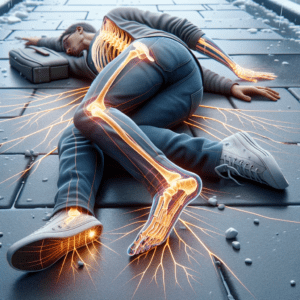Slip and fall accidents are often perceived as minor mishaps, but they can result in serious, long-lasting injuries, including nerve damage. Nerve damage from slip and fall accidents can profoundly impact a person’s life, leading to chronic pain, limited mobility, and other severe complications. In this blog post, we’ll explore the nature of nerve damage from slip and fall accidents, the legal implications, and why it’s essential to seek both medical and legal assistance.
Understanding Nerve Damage from Slip and Fall Accidents
What is Nerve Damage?
Nerve damage, or neuropathy, occurs when nerves are compressed, stretched, or severed. In slip and fall accidents, this can happen due to the sudden, forceful impact on the body. The types of nerves most commonly affected include sensory nerves, motor nerves, and autonomic nerves, each responsible for different bodily functions.
Causes of Nerve Damage in Slip and Fall Accidents
- Direct Trauma: A fall can cause direct trauma to the nerves, especially in areas like the spine or joints.
- Compression: The impact can compress nerves, particularly in cases where a person falls on a hard surface.
- Stretching: A slip and fall can stretch nerves beyond their capacity, causing damage.
For a free legal consultation,
call 1-800-414-5196
Symptoms and Diagnosis of Nerve Damage
Common Symptoms
- Pain and Numbness: Sharp, burning, or tingling pain, often accompanied by numbness.
- Weakness: Difficulty moving a part of the body.
- Sensitivity: Increased sensitivity to touch or temperature.
Diagnosis
- Medical Examination: A thorough medical examination, including a review of the patient’s medical history and the circumstances of the fall.
- Imaging Tests: MRI or CT scans to assess any physical damage to nerves.
- Nerve Function Tests: Electromyography (EMG) and nerve conduction studies.
Treatment and Recovery
Immediate and Ongoing Treatments
- Pain Management: Medication to manage pain and inflammation.
- Physical Therapy: Rehabilitation exercises to restore function and strength.
- Surgery: In severe cases, surgery may be necessary to repair nerve damage.
Long-Term Recovery
Recovery from nerve damage varies greatly depending on the severity and location of the injury. Some individuals may experience a full recovery, while others might have lasting effects.
Click to contact our personal injury lawyers today
Legal Considerations in Slip and Fall Nerve Damage Cases
When a slip and fall accident occurs due to someone else’s negligence, the injured party may be entitled to compensation. This compensation can cover medical expenses, lost wages, and pain and suffering. However, proving negligence and the extent of the injury, like nerve damage, can be complex.
What You Need to Prove in a Slip and Fall Case
- Negligence: Evidence that the property owner failed to maintain a safe environment.
- Causation: Linking the slip and fall directly to the nerve damage.
- Damages: Documenting the extent of the injuries and related costs.
Why Legal Assistance is Crucial
An experienced personal injury attorney can navigate the complexities of slip and fall cases. They can help gather evidence, negotiate with insurance companies, and represent your interests in court if necessary.
Complete a Free Case Evaluation form now
The Role of Personal Injury Law Firms
Firms specializing in personal injury, like Kass & Moses, understand the intricacies of cases involving nerve damage from slip and fall accidents. They provide compassionate and comprehensive legal assistance to ensure that victims receive the compensation they deserve.
Conclusion
Nerve damage from a slip and fall accident is a serious injury that can have long-lasting effects. Understanding the medical and legal aspects of such injuries is crucial. If you or a loved one has suffered nerve damage from a slip and fall, it’s important to seek both medical and legal assistance. For more information and support, contact the experts at Kass & Moses.
- Centers for Disease Control and Prevention (CDC) – Falls in the Workplace
- National Institute of Neurological Disorders and Stroke – Peripheral Neuropathy Information Page
This blog post is for informational purposes only and does not constitute legal advice. If you need legal assistance, please contact a professional attorney.
Call or text 1-800-414-5196 or complete a Free Case Evaluation form

